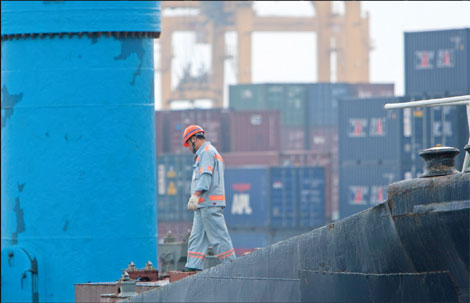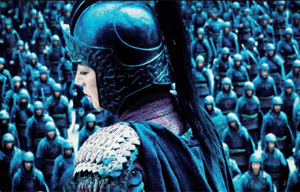Chinese economists sound warning over crises
Updated: 2011-10-25 10:36
By Hu Haiyan and Lu Chang (China Daily)
|
|||||||||
|
A worker waits to load a container onto a ship at the Dayaowan Bonded Port Area in Dalian, Liaoning province. The EU and US crises have affected the Chinese economy, economists said. Nelson Ching / Bloomberg |
BEIJING - The European Union debt crisis must be resolved within three years to avoid future problems in the global economy, though the current economic crises in the EU and the United States have created a spillover effect on China, according to Chinese economists.
"China now faces an even more complex and severe international environment compared with when it entered into the World Trade Organization, and the crises that originated from the West have definitely negatively influenced China," said Li Daokui, an adviser to the People's Bank of China (the country's central bank) on Monday.
"The current debt crisis is rooted in the internal structure of the whole Western world, and it will last for at least 10 years, but the EU debt crisis must be resolved within three years to avoid the heavy side-effects for other regions in world," Li said.
Zuo Xiaolei, chief economist at China Galaxy Securities Co Ltd, said that if the current debt crisis continues to evolve, the US and EU economic recoveries will slow down, which will affect Chinese exports.
"The debt crisis in the US and Europe will decrease the consumer spending and demand for exports from China," Zuo said.
The debt crisis remains a focal point for European leaders, who are eager to achieve a comprehensive strategy during an EU summit to tackle the debt crisis on Sunday and Wednesday.
At the Monday morning summit, however, the two lead negotiators, France and Germany, have been far apart on how to achieve a solution for the crisis.
Despite the concerns of the debt crisis' negative impacts, experts are positive toward China's economic outlook in the next 10 years.
Zhou Xiaochuan, the governor of the central bank, said on Monday that the decline in China's current account surplus as a share of its gross domestic product (GDP) shows Chinese economy is balancing out.
"It is expected that the excess, which comprises the surplus in goods, services and transfers, will fall to about 4 percent of GDP this year from a record high of about 10 percent in 2007 and 2008. This reflects China's achievements in economic transformation," Zhou said.
The Consumer Price Index (CPI), a main gauge of inflation, is expected to decline to less than 5 percent in the next two months, said Peng Sen, vice-chairman of the National Development and Reform Commission (NDRC), China's top economic planning agency.
Peng said on Saturday that the Chinese government has curbed soaring prices after it increased supplies, cut logistics costs and normalized monetary expansion.
He said that the growth of CPI will begin to decelerate in the remaining months this year.
Li also expressed his confidence in China's future economic development.
"According to our researches, the growth rate of China's GDP is expected to reach 8.5 percent next year. It is a great achievement at the backdrop of current world economy," Li said.
But China should be cautious of the negative effects brought by the faltering US economy, and the sovereign debt crisis and inflation in some countries, Li said.
"To cope with the current crisis, what China needs most is not to take up panic-driven short-term solutions. Instead, it must accelerate economic restructuring to make the economy less vulnerable to external shocks," he said.
China Daily











